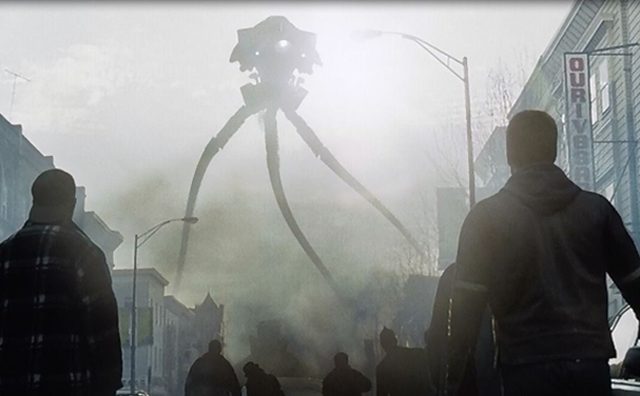
One type of story element that has been popular to both literature and cinema has been the use of allegory. An allegorical story has the benefit of addressing issues that affect the reader and the viewer in their present day, without ever being tied down by the restrictions of time or setting, or even reality. A storyteller can be as fanciful as they want with their tale, but the truths behind it will still be familiar and will resonate with the audience. Because allegory is an effective tool for addressing important issues, it’s often been used by authors and filmmakers alike to inject social and political messages into popular entertainment. We may think we’re going to read a story about animals running a farm by themselves after the farmer has left, but instead, we are treated to a meditation on the rise of Stalinist totalitarianism. We may think we’re watching Batman fighting the Joker, but instead we’re presented with an examination of the corrupting power of paranoia, and how it erodes our moral judgments. No ones goes into these story-lines expecting to be given a lecture on larger issues, but we’re rewarded with thought provoking ideas that actually enrich the experience overall. However, though allegory is useful for tackling universal issues, there comes a risk of having that same allegory unfortunately tied to the time and place that it was used. Now, time does shine favorably on antiquated allegories, because it does cast light on ideas from the past and how storytellers observed the world that they lived in. But, when one storyteller tries to take one allegorical story and re-purposes that into a different setting or time, well then you start to see problems in the adaptation.
One of the most interesting authors who used allegory to great effect in his work was H.G. Wells. Wells, along with his contemporaries at the time (Jules Verne, Arthur Conan Doyle, Edgar Rice Burroughs) created for the most part what we know now as modern Science-Fiction. But, while Verne wrote about the ingenuity and wonder of science, and Burroughs wrote about the fantastical and otherworldly aspect, Wells was much more interested in the dangers of science. Wells was a political writer in addition to being a creative one, and he often sought to address larger societal issues in his writing. But, what set him apart from other political writers was the fact that he always wrote with an eye towards popular entertainment. When his work was published in the late Victorian period in England, people were far more interested in stories about adventure and exploration, and far less about social issues of the day. So, with an eye towards allegory, Wells found a way to force these important issues of the day into the public eye by including them in the kinds of stories they would normally clamor for. His best example of allegory disguised as popular entertainment would be the 1898 classic The War of the Worlds. Yes it’s got monstrous aliens and tension filled horror that readers would have found engaging, but when you read deeper, you see the intent of what Wells was trying to say. He lived in a world corrupt by the idea of Empire and exploiting the less fortunate for the benefit of those who had everything. By flipping the concept on it’s head, and having the seemingly mighty Great Britain invaded by a superior, extra-terrestrial force, Wells was making his audience see their world in a different light. It’s an allegory that fits it’s time well, but when adapted for another period, like in Steven Spielberg’s 2005 adaptation, you can see how an allegory’s effectiveness can change with it.
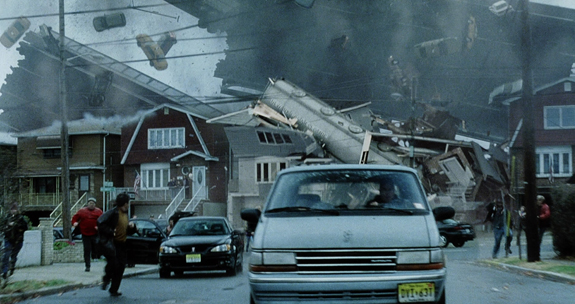
“No one believed in the early years of the 21st century that our world was being watched by intelligence greater than our own.”
Steven Spielberg’s 2005 War of the Worlds is a fascinating, if somewhat flawed adaptation of Wells classic novel. In many ways, it retains a faithful adherence to the tension and paranoia of the original novel, and yet, some of that adherence ends up doing a disservice to the actual message that the director wanted to deliver in his movie. What is fascinating however is how allegories from another time and place take on a whole new meaning when adapted into something else, and that’s the case with Spielberg’s film. When H.G. Wells first wrote his novel, England was the dominant power in the world, with an Empire that included territory on every continent across the globe. In his day, the notion of invasion from a superior power would have seemed foreign and purely in the realm of fiction, but Wells wanted to address this arrogance of such a notion in his novel and the foolish nature of viewing oneself as superior to others. When Spielberg sought to tackle Wells classic story, England’s empire had long diminished and America had emerged in the years since as the world’s most powerful nation. But, unlike when Wells had written his novel, in 2005, America was still reeling from the recent attacks of 9/11. Though the country wasn’t attacked by a superior force akin to Wells’ Martians, it was still an attack that shook the foundations of our country and it’s a struggle that we have yet to shake off even today. Spielberg adapted the story in a time when even the mighty could be brought low by outside forces, and in a sense, that’s where his adaptation actually gives a fresh new meaning to Wells’ tale. According to Spielberg in the making of documentaries found on the War of the Worlds DVD, he wanted to create a vision of a refugee experience in America, where survivors of the alien invasion are forced to flee their homes and survive in an increasingly hostile world. It’s something he says you don’t see in our society today, which is a concept close to Wells’ own intent. Where Wells addressed a society arrogant in that they never believed they could be invaded by a superior force, Spielberg was addressing a society that felt apathetic towards refugees across the world because they too never thought it could happen here.
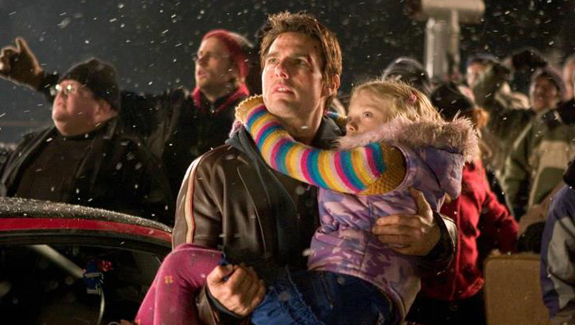
“It’s the same everywhere – once the tripods begin to move, no more news comes out of that area.”
Now, with an adaptation, especially one that changes the time and setting of an original story, there obviously needs to be alterations made to both the plot and, specifically with this movie, the characters. In this aspect, I actually believe that Spielberg did Wells one better. Wells original novel was less interested in character development, and far more interested in describing the world in which they inhabit. His main character isn’t even named in the novel, and it’s told entirely from his perspective. In this case, it’s a presentation that suits Wells novel, because it allows the reader to better identify with the narrator and see the horrors of the alien invasion through a first person account. It’s a presentation brilliantly re-imagined in Orson Welles legendary radio adaptation, which works because it’s another medium that allows for the audience to paint the picture in their own minds. However, those same rules don’t apply to film, where we need characters with depth and personality in order to follow their story. Spielberg and his writers Josh Friedman and David Koepp, created the entirely original character of Ray Ferrier to be the substitute for the nameless narrator. In addition, they added a family dynamic to the story by having Ray (Tom Cruise) escaping the destruction around him by having his children Rachel (Dakota Fanning) and Robbie (Justin Chatwin) in tow. Though some of their family drama is cliched in the movie, it nevertheless gives the story a human face it desperately needs, and all credit is due to the cast for believably immersing themselves into the film’s situations. Tom Cruise in particular manages to put his matinee idol status in check and conveys to us that he’s a broken man who’s desperately trying to stay strong through a perilous situation. And the movie smartly keeps the story focused on their survival. It’s not about grander geopolitical ramifications. It’s about survival, and that fits much better into Spielberg’s refugee allegory.
But, though Spielberg changes the human perspective and creates a whole new story-line with his new main characters, it doesn’t mean that Wells’ story is unrecognizable either. In fact, much of the actual invasion that takes up most of the movie is pulled directly out of the novel. The Tripods themselves in particular are almost exactly as Wells envisioned them. The only difference made about the invading force is their origin, and it’s an understandable change. In Wells time, Mars was believed to have been an inhabitable world filled with Martian people (a concept that Edgar Rice Burroughs also shared in his John Carter series) and it made sense to him and his audience that an alien invasion could naturally come from our nearest celestial neighbor. Of course, we now know that Mars is inhabitable, so Spielberg is more vague about where his aliens came from. And, in the end, it really doesn’t matter. The tension actually comes out of not quite knowing what’s going on and it’s a story point that serves well both the novel and the movie. Spielberg almost relishes the overwhelming threat that the Tripod vessels pose to the characters, giving them the sense of scale that they deserve. From the moment that the first Tripod rises out of the ground, it invokes a sense of true terror into the hearts of anyone who sees it. And when it begins blasting people away with it’ s heat ray, it is truly shocking. I think that it’s what makes Spielberg the best possible choice to adapt Wells work. They both work in the realm of popular entertainment, but they also take in the gravity of their story-lines, and address the fantastical bits with the same seriousness that one would with a real life emergency. The Tripod attacks are easily the highlights of the movie, and where Spielberg adapts Wells’ vision to it’s fullest potential.
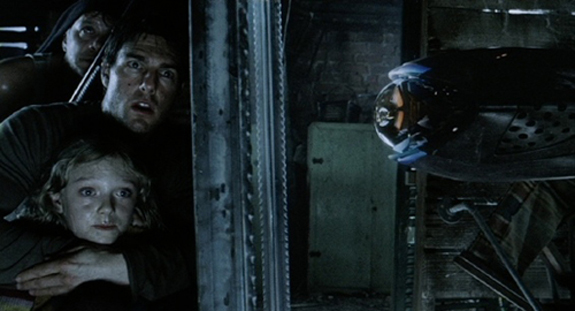
“This isn’t a war any more than there’s a war between men and maggots… This is an extermination.”
But, the problem with transplanting the setting of your allegorical story is that not all the pieces will translate quite as well outside of their original context. For a lot of people, where the movie actually falters is in it’s later half, after it appears that Ray has lost his son Robbie in one of the attacks. He and Rachel find shelter in a nearby farmhouse being occupied by a mysterious and somewhat unhinged man named Ogilvy (Tim Robbins). It’s this scene in the basement that really breaks apart the audience reaction to this movie, from those who love it to those who hate it. I’ll agree that it is a problematic stretch of the film because it completely shifts gears and slows the story down to a halt. What was a harrowing adventure about staying alive amid almost certain death suddenly becomes a claustrophobic human drama where the danger becomes more internalized. I don’t dislike the scene (the part where they hide from the alien probe is spectacularly staged), but it does feel out of place in the film. But, it’s also strangely enough from the original novel, albeit condensed. People tend to forget that Wells, like many other authors of the time, published his work in serial form, and War of the Worlds was released in two separate volumes. His first volume portrayed the invasion; the second, the aftermath. Spielberg tried to put the two together into one narrative, but the mashing together is very awkward and diminishes the effectiveness of both sides of the story. More than anything, I think it’s the abruptness that became the problem. The farmhouse is indeed where much of Spielberg’s allegory of post-9/11 paranoia comes into play, but it does so in detriment to the momentum of the action. He could have indulged himself in more of the spectacle of mayhem, but he would have lost that crucial allegory in the process.
The film falters, but not for the sake of trying on Spielberg’s part, nor because of trying to force Wells’ novel into modern times. Adaptations are just difficult to pull off, even when they are faithful and done with good intentions. For most of the movie, Spielberg actually delivers on the thrills and the sense of awe, but then he ends up undermining the things that he was trying to accomplish within even the very next scene. I think one of the biggest mistakes he made overall was actually showing us what the aliens looked like. True, Wells did that as well in his novel, describing the Martians as spindly, grey skinned tri-ped creatures. It’s fine to be descriptive on the page, but visualizing that on the big screen is different, and will likely please no one. This movie, as well as the 1953 adaptation produced by George Pal, were at their best when the aliens remained hidden within their machines. But, you take them out, and show them as the more vulnerable creatures that they are, you lose the menace that they pose. What Wells wanted to show in his novel was that these aliens were superior to us in every way, and that this superiority is what made them malicious towards us. It was his critique of the concept of Social Darwinism, which proclaimed that the strong were entitled to rule above others because it is natures will; a perversion of Darwin’s theory of evolution that would go on to inspire many despised philosophies like Eugenics and even Fascism. By showing humans as the weak instead of the strong, he is able to make us look at how our own arrogance about our place in the world has driven us to do horrible things to those that we view as inferior. It’s a concept that could have worked just as well in Spielberg’s adaptation, in a world shaken by Terrorism and how confronting an undefinable enemy has left many displaced and disillusioned, but that all goes away once we see the bizarre looking aliens who carry none of the menace that this story needs. And it’s a strange underwhelming tactic used by someone who has been so good at creating menace out of non-human forces (the shark in Jaws or the raptors in Jurassic Park) in the past.
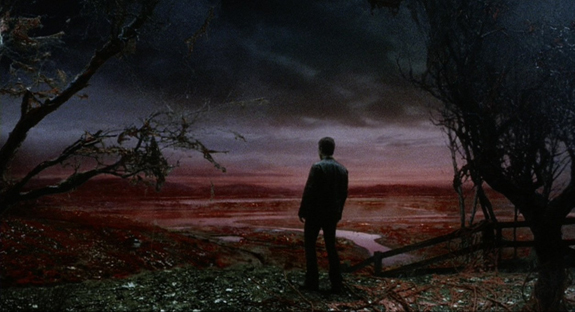
“When it’s ready, my body will just push it out.”
While there are flaws, you can’t say that Spielberg and Cruise didn’t try their best to bring Wells’ classic to life in the 21st century. When it does get it right, it does so in a spectacular way. The Tripod alien death machines are hauntingly realized and could be among the most frightening things we’ve ever seen in any science fiction film. Some of cinematographer Janusz Kaminski’s best work is in this movie, including the amazing ferry boat scene and the facade of the church being destroyed by the cracking earth beneath it. I can also praise the unsettling music written by John Williams too. But, despite high quality work done by all involved, you can’t help but think that the sum of what they had didn’t quite add up to what they wanted. And some of the fault of that might be in the adaptation itself. Wells novel was a product of it’s time, but also one that addressed many issues that we still deal with today. Wells delivered us a harrowing vision of what it might be like to have our securities challenged by something that is greater than ourselves, and he did so in a narrow, claustrophobic point of view. It works because it puts us into the shoes of a survivor and asks us to see how one has to live when they have nothing. Spielberg tries to do that by constantly pushing his characters into harms way, but he ultimately undermines his message by rewarding his characters with a happy resolution. The only time that it doesn’t make things so easy is when Ray must commit a murder to save his own child, but sadly, this character defining moment is underplayed. And seriously, his son appearing at the end is one of the worst plot twists ever, and more than anything is an insult to what Wells intended. But, apart from that, I do admire Spielberg’s attempt to find new allegorical meaning in War of the Worlds in the chaotic world that we find ourselves in. It shows that Wells story was far more prescient and universal than he knew, and that a message worth saying can still find it’s place in blockbuster entertainment.
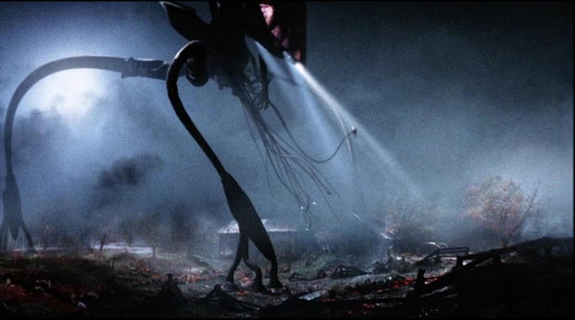
“By a toll of a billion deaths, man had earned his immunity, his right to survive among this planet’s infinite organisms. And that right is ours against all challenges. For neither do men live nor die in vain.”